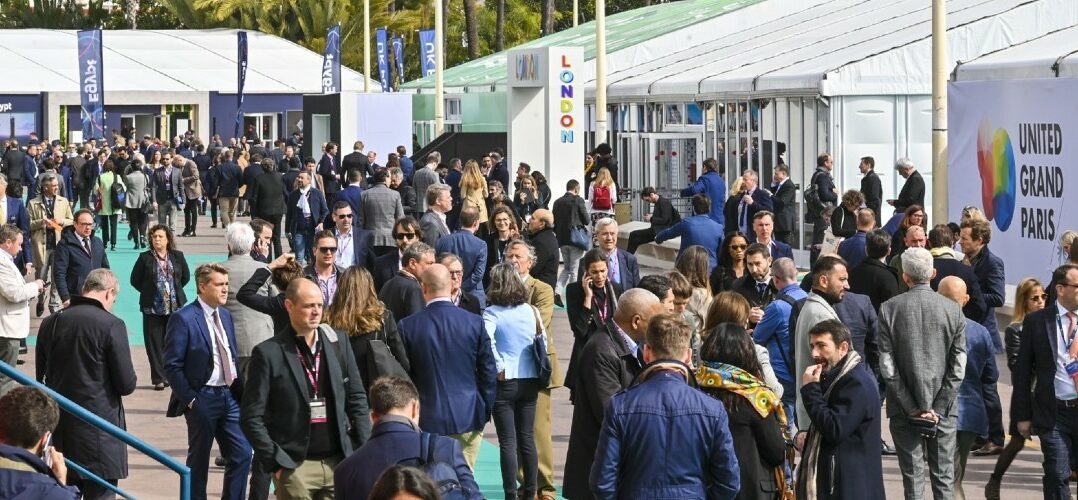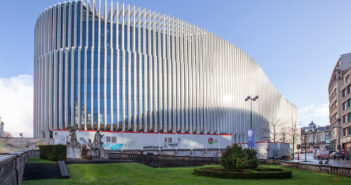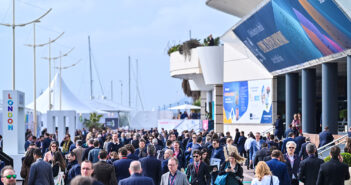During a busy Day 2 of MIPIM 2022, the ‘Driving Urban Change’ programme has shone a spotlight on the most important topics facing the real estate ecosystem today and included discussions and debates on diverse issues, from sustainable cities and the metaverse to ESG principles and real assets.
Cities for citizens, the big debate
The second round of our big debate series, Cities for Citizens was hosted once again by Christopher Choa, Founder of Outcomist. This morning he was joined by Remigijus Šimašius, Mayor of Vilnus; Lee Polisano, President of PLP Architecture; Abby Shapiro, Head of Office, Retail & Life Science, Europe for Oxford Properties; Maud Bailly, CEO Southern Europe for Accor and Manfredi Catella, Founder & CEO, COIMA SGR SPA.

Mayor Remigijus Šimašius began the debate by highlighting that 95% of public life takes place in the street. The street is therefore “the mirror of the city.”
Lee Polisano of PLP Architecture argued that three principles that should govern the cities of the future are fairness, sharing and connectivity, stating that our current cities “by and large are not fair”. Polisano believes that “the city must become one large, connected ecosystem that fully supports the weakest link for the benefit of all.”
Abby Shapiro of Oxford Properties highlighted that after COVID and with advances in technology it has meant that people do not need to go into cities. However, she highlights that for companies to require employees to go back into the office “is counterintuitive.”
We need to bring the public and private sectors together to reduce the friction which makes people not want to come into cities – Abby Shapiro of Oxford Properties highlighted
Providing a perspective from the hospitality industry, Maud Bailly of Accor points to increased use of the ‘glocal’ hotel and people using hotels in their local communities. She believes the hotel industry has a new mission defined by three core aims, to be [1] ‘glocal’ [2] sustainable and [3] caring. The hotel as a caring place, a place which can look after people in need is a new dimension for hotels that came forward in COVID.
Rounding off the discussion Manfredi Catella, COIMAR SGR points to the next generation as the ones who will need a new type of city, and the importance of observing and learning from them now as they show us what will be important for citizens of the future.
Real Estate much more than an asset: Prime real estate, location or features?
What are the value generating assets favoured in a post-Covid world?
One of the first sessions of the day was chaired by Courtney Fingar, Editor-in-chief at Investment Monitor and sponsored by Prologis and Allianz. With her on the panel were Ben Bannatyne, President of Prologis Europe; Marielle Seegmuller, Operations Director at Covivio and Megan Walters, Global Head of Research at Allianz Real Estate.
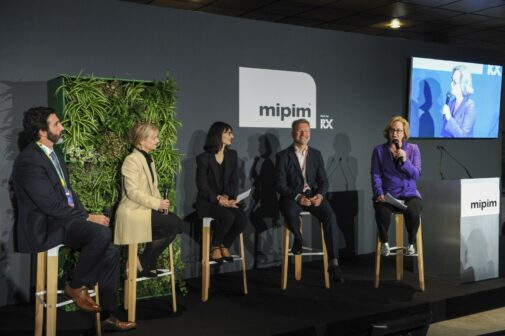
Ben Bannatyne, President of Prologis Europe started the discussion by giving insights into the logistics sector. « In logistics we shifted the focus towards development. Land is getting scarce. Everyone wants parcels delivered in a day. So we have to look at different products. We are looking at urban, multi-story and retails parks. »
Megan Walters at Allianz Real Estate highlighted that, « Our research on office resilience in 47 cities concluded that high-density cities are resilient because of their alternative use of office space. People want to go to the office to be social. The best locations are city centres with social infrastructure. »
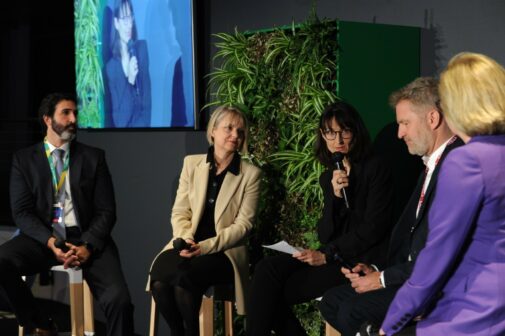
Marielle Seegmuller from Covivio argued that, « The pandemic has accelerated the trend of demand in office amenities and focus on public transport. User experience is key with the office building becoming a part of a company’s identity. »
Giving his perspective on the market Lucas Fiuza from APEX Brazil added:
The leisure market in Brazil is booming, and we are expecting this trend to continue with the return of foreign tourism – Lucas Fiuza from APEX Brasil
The panellists also discussed the influence inflation will have on the real estate market. Lucas Fuiza contributed that for the Brazilian market, prudence and trying to be ahead of inflation are currently important strategies.
Green is the new black: ESG principles driving re-investment
ESG has become one of the most important discussions in the real estate industry and beyond.
What does this mean and what does the future look like?
This morning, Clare Thomas, Partner at CMS Cameron McKenna Nabarro Olswang LLP chaired the Green is the New Black discussion on ESG principles driving re-investment. She was joined by experts in the sector, Guy Grainger, Global Head of Sustainability Services & ESG at JLL; Abigail Dean, Global Head of Strategic Insights, Nuveen; Sara Jane Viereck, VP ESG Europe at Prologis and Donato Saponara, Head of Transactions West Europe & Country Head of Italy at Allianz Real Estate.

Sarah Janes Viereck, from Prologis began the discussion by sharing her thoughts, “I think that the best solution in ESG is one that ticks all the boxes, it’s going to be something that is good for the customer, good for people and good for the environment.”
Donato Saponara from Allianz added, “You have to find a likeminded tenant and engage with them. Everything we do with assets comes through dialogue with tenants and it enabled us to deliver ESG and well-being.”
Abigail Dean from Nuveen emphasised, “The first place to start for many real estate businesses, is the operational energy use within their buildings. Getting that down to a highly energy efficient level, and then supplementing what is the remaining energy need with renewables.”
Guy Grainger of JLL made a strong point:
You have to relate everything back to the people in the buildings because that’s what the tenants are interested in. How do you ensure that this is an attractive place for people to work? And when they’re here, that they’re productive, healthy and really happy – Guy Grainger of JLL
The Office Uprising: Innovating to Bounce Back, Part 2
In the second part of MIPIM’s the future of the office series, our experts shared their opinions and experiences on how companies will reconfigure their post-pandemic office footprint. Larissa Lapschies, CEO of Immobilienjunioren, chaired the discussion and was joined on the stage by Mark Dixon, CEO and Founder of IWG; François Pitti, Group Director, Strategic Marketing at Bouygues Construction and Stephen Brown at WELL Certified.
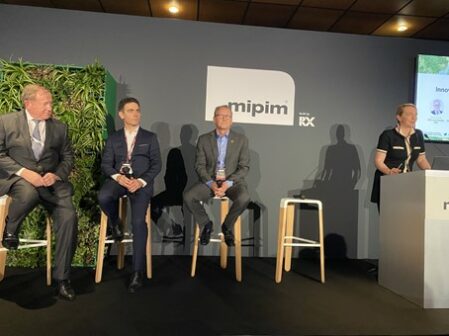
Founder and CEO of the workspace network IWG, Mark Dixon, has seen the shift towards flexible working arrangements for years but says this trend was accelerated by the pandemic, « The geography of work and the design of buildings will change.” He predicts that the change to hybrid working is here to stay and the real estate market is changing – quickly fuelled by technology. “Real estate will be a platform of buildings which workers use – not tenancy. This is a big change for investors. This means investing in platform not individual assets, » he added.
Stephen Brown said that many conversations he has with companies concern ESG metrics. “What we are seeing is that health and wellbeing are having a huge impact on ESG metrics.” He added that at WELL Certified, developing methods to start measuring and reporting on such ESG metrics is gaining interest from clients. He also talked about the importance of giving employees choice.
People, people, people – that’s where it all begins! The office must reflect how humans thrive – Stephen Brown
Brown continued, “For us to thrive you need choice. Young people are demanding it and the C-suite is starting to recognise the importance of freedom for employees. »
François Pitti at Bouygues Construction picked up on this point. In his view, the nature of work has been radically transformed. Employees’ expectations around working arrangements and the office environment are turning into the requirements and demands that influence a company’s recruitment and retention strategies. While employees want flexibility in the working environment, he adds that connectivity is key. Meeting in-person is key for decision making. There needs to be a balance of digital and in-person interaction. This is a fine balance for companies. »
Edouard Philippe Keynote
Using Le Havre as an example, its current Mayor and former Prime Minister of the French Republic, Edouard Philippe shared his vision of what the city of tomorrow should be and of the role of political leaders in this transformation.

Edouard Phillipe started by outlining that we live in a world where evolutions are sudden and difficult to prevent; he added that « imagining what the city of tomorrow could be, is like making a bet on what will happen in the future. We must come back to reality, the future is uncertain and the city must always adapt. »
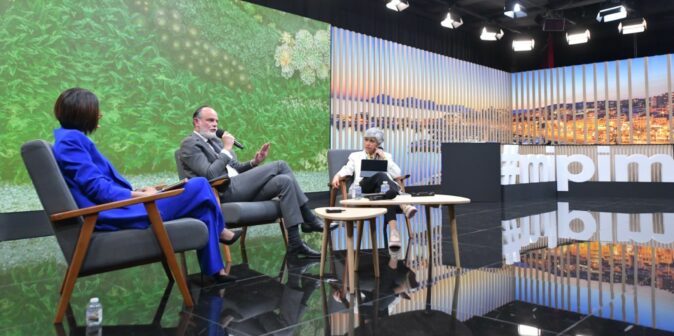
Meka Brunel from Gecina joined the discussion and questioned Edouard Philippe on adapting cities to future climate and social changes. Edouard commented “in risk prevention, you have to get out of the norms and think of new innovative solutions.”
Our society must emphasize science, innovation and technology – Meka Brunel from Gecina
